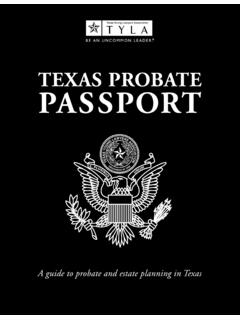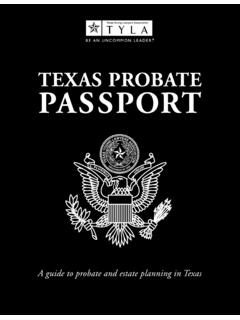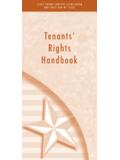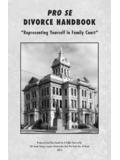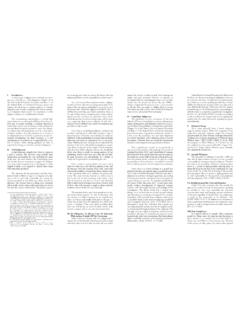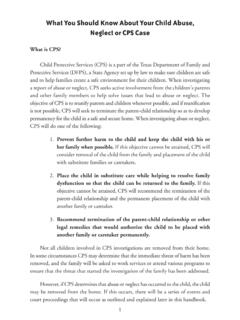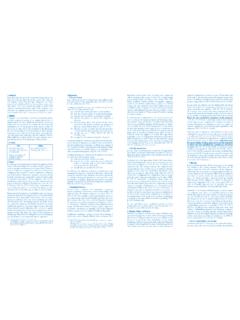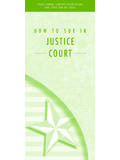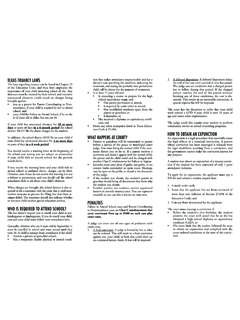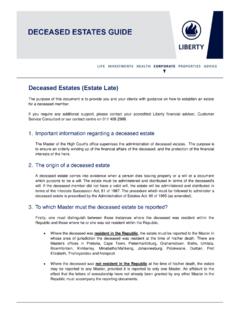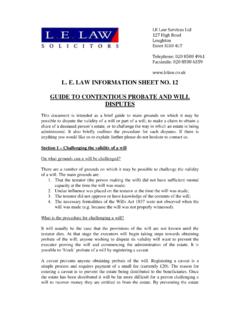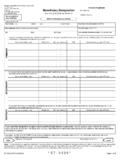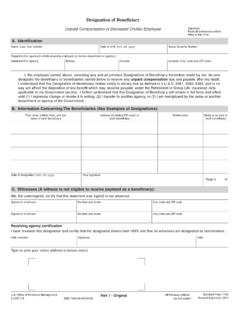Transcription of Texas Probate Passport A guide to probate and estate ...
1 Texas Probate PassportA guide to Probate and estate planning in Texas Texas Probate Passport has been prepared to inform the public regarding: (1) what happens legally to the propertyof a person when he or she dies with a will or without a will (see tab entitled To Will or Not to Will ); and (2) howthe Probate process works (see tab entitled Probate in Texas ). The Checklists tab provides lists to assist in preparinga will, and in preparing for Probate . The Texas Young Lawyers Association (TYLA) seeks to make Texas residents awareof how the law (the Texas Probate Code) affects them and their families. This handbook is not a substitute for the adviceof a lawyer, but instead is designed to assist Texans in learning about their legal rights. Texas Probate Passport incorporates material found in a previous TYLA publication called To Will or Not toWill, which was first published in 1986.
2 1986, 1991, 1994, 1996, 1999, 2000, 2002, 2004, 2010, 2011 Texas Young Lawyers Association The TYLA Texas Probate Passport Team:Natalie Cobb Koehler, TYLA PresidentAlyssa Long, TYLA Chair-Elect and Executive Committee AdvisorSarah Rogers, TYLA Secretary and Executive Committee AdvisorRebekah Steely Brooker, TYLA DirectorGeoff Gannaway, TYLA DirectorJason Lemons, Probate Passport Committee MemberSteven Hallbauer, Probate Passport Committee MemberAmy Lewis, Probate Passport Committee MemberSarah Duff, Probate Passport Committee MemberSpecial Thanks to Jeannine Flynn and The Real estate Probate Trust Law SectionFor more information on wills and advanced planning, please contact the Texas Young Lawyers Association at (800) 204-2222, Ext. 1800 TO WILLORNOT TO WILLS ection 1 You Can t Take It With You ..1 Section 2 Dying Intestate (Without A Will).
3 1 Section 3 Disadvantages of Dying Without A Will ..1 Section 4 Children and 5 Executing A Will To Achieve Desired Property Distribution ..3 Section 6 Probate of Wills ..4 Section 7 estate 8 1 You Can t Take It With YouDeath affects people in many ways. It never is timely. Death confronts the family with bereavement, with the needto readjust emotionally and financially, and often with an unknown future. Death is not only a personal issue but a legalone as well. A death certificate must be issued, and the estate of the deceased individual (the decedent) must pass to others. An estate consists of the property, both real and personal, which the decedent owns at the time of death. Real propertyincludes land and improvements located on the land. Real property also includes oil, gas, and other mineral property is all property other than real property, including cash and bank accounts, clothing and personaleffects, household furnishings, motor vehicles, stocks and bonds, life insurance policies, and government, retirement, oremployee benefits.
4 Upon death, title to the decedent s property passes immediately to the beneficiaries under the decedent s will or tothe heirs-at-law if the decedent died without a will. However, there must be an actual transfer of ownership of the propertyby proving the will in court or, if there is no will, by having a court determine who are the decedent s heirs. The purposeof court involvement is to protect the rights of the family, those entitled to receive property, and the creditors of thedecedent s estate . Therefore, although title to property passes immediately at death, the assets of the estate are subject to the controlof the executor or administrator of the estate for the purpose of settling the debts of, and claims against, the estate . Afterthe payment of debts and claims, the remaining assets are distributed to the decedent s beneficiaries or heirs-at-law.
5 If thedecedent died with a legally valid will, then his or her property is distributed according to his or her wishes as expressed inthe will. On the other hand, if the decedent died without a will or if the will is declared invalid, the estate is distributed tothe decedent s heirs as determined under Texas law. The decedent s heirs may not be the persons to whom the decedentwished for his or her property to 2 Dying Intestate (Without A Will)In Texas , property is characterized as separate or community. Separate property is that which is owned before marriageor acquired during marriage by gift or inheritance. Damages awarded during marriage from a personal injury lawsuit, exceptdamages representing the loss of earning capacity, also are separate property. Community property is all property, other thanseparate property, which is acquired by either spouse during marriage.
6 Thus, there can be separate real property, separate personal property, community real property and community personal property. When a person dies without a will, the lawdetermines who are the heirs, and assets are disposed of according to whether they are community or separate 3 Distribution of Community PropertyCommunity property, whether real or personal, is distributed in this manner: 1. If the decedent is survived by a spouse and children (or descendants of deceased children): If all surviving children and descendants of the deceased spouse are also children or descendants of the survivingspouse, all of the community property passes to the surviving spouse. If any surviving child or descendant of the deceased spouse is not also a child or descendant of the survivingspouse, the deceased spouse s one-half of the community property passes to his or her children (and the descen-dants of any deceased child), and the surviving spouse retains the one-half of the community property he or sheowned prior to the other spouse s death.
7 However, the surviving spouse has the right under Texas law to use and2occupy the homestead during his or her life and may have the right to use or own certain items of personalproperty that are exempt from creditors claims. Example 1: Husband (H) dies without a will. H is survived by Wife (W) and by his three children (A,B, and C). A, B, and C also are the children of W. In this case, all of the community property passes to W. Example 2: Same as Example 1, except H is survived by a child (D) who is not also a child of W. Now,A,B,C, and D share equally in H s one-half of the community property, and W simply keeps the one-halfof the community property that she owned prior to H s death. To illustrate, let s apply this rule to acommunity bank account with $1,000 in it. The $1,000 is distributed as follows:W: $500 (Many people incorrectly think that W gets the entire $1,000.)
8 A, B, C, and D: Each receives $125 (1/4 of $500) Example 3: Same as Example 1, except W has a child (E) by a prior marriage. E is alive at H s of the community property still passes to W. It does not matter that W has children who are notalso H s If the decedent is survived by a spouse but not by any children or descendants, all of the community propertypasses to the surviving If the decedent is not survived by a spouse, all property is separate property because the community estateterminates at the death of the first spouse. The following section discusses the intestate distribution of separate 4 Distribution of Separate PropertyThe distribution of separate property of a person who dies without a will depends on whether it is real or personalproperty. Separate property is distributed in this manner: 1.
9 If the decedent is survived by a spouse and children (or descendants of deceased children), then subject tothe surviving spouse s rights with respect to the homestead and exempt personal property: Separate personal property passes one-third to the spouse and two-thirds to the children (and thedescendants of deceased children). Separate real property passes to the children (and the descendants of deceased children) subject to a lifeestate in one-third of the property in favor of the surviving spouse. This means that the survivingspouse is entitled to use one-third of the real property during his or her lifetime, and upon his or herdeath, the children (or descendants) will have full title to the separate real property of the decedent. 2. If the decedent is survived by a spouse but not by any children or descendants, then subject to the survivingspouse s rights with respect to the homestead and exempt personal property: All separate personal property passes to the spouse.
10 Separate real property passes one-half to the spouse and one-half to the decedent s parents or collateralrelatives, such as brothers and sisters or their descendants. 3 If no parents, brothers, sisters, or their descendants survive, then all separate real property passes to thesurviving spouse. 3. If only children or their descendants survive, all separate personal and real property passes to the children ortheir descendants. 4. If both parents survive, but not the spouse or children or children s descendants, all separate personal andreal property passes one-half to each parent. 5. If only one parent and brothers or sisters survive, separate personal and real property passes one-half to thesurviving parent and the remaining one-half is divided equally among the brothers and sisters or theirdescendants. However, if no brothers or sisters or their descendants survive, then all separate property passesto the surviving parent.
